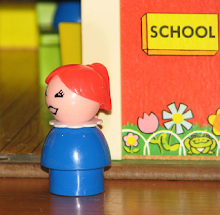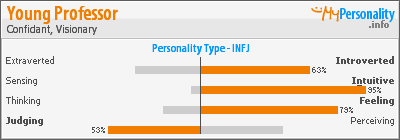Like Grendel, I have a powerful mom. She saves my ass when I call her at 9:30 in the evening. "I've been trying to prepare class all day!," I say. "The entire day! And I still don't know what I'm going to do with them tomorrow!"
"Okay," she says. "We can figure something out. What are they supposed to be working on?"
I tell her that their first big assignment is something called a process essay. I don't even know what a process essay is. I more or less copied the sample syllabus that was given to me, verbatim, and now that we're in the semester I am seriously regretting this; the syllabus isn't the clear map it had appeared to be. On closer inspection, it's a document full of mysterious heiroglyphics, unhelpful labels like "in-class writing exercise" branded across whole days; I'm shackled to agendas that I don't even understand, and discovering whole levels of variables I hadn't even counted upon.
"Ah, a process essay," she says. "Right. I've done those before." Turns out a process essay is where you write about something that you know how to do well, and you describe the steps in order so that someone else, after reading your essay, will know how to do it too. "It sounds easy," she says, "but don't worry. They'll have some trouble with it."
My mother thinks. "Okay, all right," she says. "So here's what you do. Break them up into groups. Groups of like...maybe four. Have each person make a list of ten things they know how to do well. They will have a hard time thinking of things they know how to do well. You may need to suggest stuff. So then, when they're done with that, have each of them pick one. And they write down the steps. And then, have them put their notebooks away. And each one of them does a little presentation for the other ones, describing how to do the thing. Have the other ones do critique, if there's something they don't understand, or something out of order. All this will probably take more than an hour. Then, at the end, have them give their presentations for the class. Or maybe...have them nominate the best presentation from each group and give that to the class. This all shouldn't take you very much more prep time. You should spend another half an hour max on this tonight."
Saved my ass, she did. And she even sounded happy to be asked.
What the teacher learned: You need to have a teaching fairy god-familymember. If you're not blessed with a teaching mom, make some teaching friends. They already know how to do what you couldn't figure out in eight hours of skimming the internet and hyperventilating.
Also, I am pretty much ready to write my own process essay on 'how to fill 90 minutes of class...once.' One session down, 23 to go.
Tuesday, August 26, 2008
Thursday, August 21, 2008
Self-Introductions
Before the first day of class, all faculty members receive an email from the department head. The first class meeting, he explains, should by no means be considered a "meet and greet." We have a short semester, and to set the tone for it, it's essential, besides going over the syllabus and course policies, to actively teach something on the first day.
Yes! I think. I'm going to teach something on the first day. It will be short, lean, elegant, and bad-ass...like Lucy Liu in the form of an in-class exercise.
But as the day approaches, I haven't come up with much. 'I want to know who these kids are and where they're coming from,' I think. 'And I want them to know each other. If we know each other a little, the class will be better able to function as a community.'
So, in the end, after racing too fast through the syllabus ("so uh...plagiarism! You know what that is, right? Basically, plagiarism, don't do it! Big pain in your ass, it'll be..."), I hand out a first-day questionnaire, and invite the students to write (writing in class! Just like we're supposed to!) a response to share with their colleagues and me.
I ask where they're from, what if anything they like to read, what kinds of writing they've done most of, what brought them to this college, and as a getting-to-know-you type deal, what would be their idea of the perfect day.
The students write, and I write, and then we go around the room and we read. Ninety percent of them cite an afternoon at the beach with friends and family as the best way to spend a day. I begin to wonder whether they are unimaginative, or whether all this uniformity is part of a calculated decision not to reveal much. I'm some lady they just met, and these are their peers whose respect they probably want, so maybe no one wants to break out of the herd and mention how the perfect way to spend a day would involve rolling out of bed at noon, inhaling a big plate of spaghetti carbonara for breakfast, and watching episode after episode of America's Next Top Model. I end up feeling like I don't know them that much better at all, and my ambivalence about soliciting personal information through assignments is born. On one hand, I do want to know these kids; desire for work that allows for live, personal connections is one of the main reasons why I'm here in this windowless box at 8 in the goddammer, instead of still doing my full-time-in-front-of-the-internet job. On the other hand, I'm beginning to appreciate that these questions might be considered invasive, and that the students have signed up for a course on how to write, not Young Professor's Selfcraft 101. This struggle will be revisited in later posts.
I write my own intro and also wonder how much to reveal and how much not to. I tell the students that I went to college in the Pacific Northwest, that I have a master's degree in English from an Ivy League U., and something about the work that I have done in New York since earning my degree. I describe a perfect day spent by a lake with—uh-oh, here it comes—family and friends—and that the day would probably include reading and maybe even a little writing. I sound like such a schoolmarm, I think, and I also think that while the day I describe sounds pretty nice, it's hardly the most interesting or revealing 'perfect day' I could come up with. As I assume my students have done, I too have sanitized. It isn't easy to reveal yourself to strangers.
We finish half an hour early and with a sense of slight failure balanced by a determination to do better next time, I let them go.
The self-introductions in bubbly handwriting pile up on my desk as the students file out.
A day at a lake. Can I do any better with you? A few posts from now, I'll try.
Yes! I think. I'm going to teach something on the first day. It will be short, lean, elegant, and bad-ass...like Lucy Liu in the form of an in-class exercise.
But as the day approaches, I haven't come up with much. 'I want to know who these kids are and where they're coming from,' I think. 'And I want them to know each other. If we know each other a little, the class will be better able to function as a community.'
So, in the end, after racing too fast through the syllabus ("so uh...plagiarism! You know what that is, right? Basically, plagiarism, don't do it! Big pain in your ass, it'll be..."), I hand out a first-day questionnaire, and invite the students to write (writing in class! Just like we're supposed to!) a response to share with their colleagues and me.
I ask where they're from, what if anything they like to read, what kinds of writing they've done most of, what brought them to this college, and as a getting-to-know-you type deal, what would be their idea of the perfect day.
The students write, and I write, and then we go around the room and we read. Ninety percent of them cite an afternoon at the beach with friends and family as the best way to spend a day. I begin to wonder whether they are unimaginative, or whether all this uniformity is part of a calculated decision not to reveal much. I'm some lady they just met, and these are their peers whose respect they probably want, so maybe no one wants to break out of the herd and mention how the perfect way to spend a day would involve rolling out of bed at noon, inhaling a big plate of spaghetti carbonara for breakfast, and watching episode after episode of America's Next Top Model. I end up feeling like I don't know them that much better at all, and my ambivalence about soliciting personal information through assignments is born. On one hand, I do want to know these kids; desire for work that allows for live, personal connections is one of the main reasons why I'm here in this windowless box at 8 in the goddammer, instead of still doing my full-time-in-front-of-the-internet job. On the other hand, I'm beginning to appreciate that these questions might be considered invasive, and that the students have signed up for a course on how to write, not Young Professor's Selfcraft 101. This struggle will be revisited in later posts.
I write my own intro and also wonder how much to reveal and how much not to. I tell the students that I went to college in the Pacific Northwest, that I have a master's degree in English from an Ivy League U., and something about the work that I have done in New York since earning my degree. I describe a perfect day spent by a lake with—uh-oh, here it comes—family and friends—and that the day would probably include reading and maybe even a little writing. I sound like such a schoolmarm, I think, and I also think that while the day I describe sounds pretty nice, it's hardly the most interesting or revealing 'perfect day' I could come up with. As I assume my students have done, I too have sanitized. It isn't easy to reveal yourself to strangers.
We finish half an hour early and with a sense of slight failure balanced by a determination to do better next time, I let them go.
The self-introductions in bubbly handwriting pile up on my desk as the students file out.
A day at a lake. Can I do any better with you? A few posts from now, I'll try.
Tuesday, August 19, 2008
Emerging
The college where I teach is tucked into the more-tolerable side of midtown Manhattan. I had never heard of this college before I began to teach here, and neither have you. Its students aspire to jobs in the less-glamorous arm of a glamour industry that thrives in big cities like this one. The school offers so few courses in the humanities and liberal arts—courses that I considered almost the full range of possible studies when I was in school—that there is only one department for all of these things.
I am an adjunct, a job I will soon liken to parachute-jumping: I descend from the sky (or rather, I emerge from the mouth of my MTA tunnel) twice a week, early in the morning, and I push through the doors of this institution, which open for me and the magnetic key-card that bears a picture of my face looking first-week frazzled. I ascend to the faculty offices of a different department—I take the stairs, the elevator is clogged with undergraduates chatting about their roommates and the night before—copy my handouts, and forge into the computer classroom at the top floor where I teach the 18 students who have been assigned to me. The room has neither skylights nor windows. It's a computer classroom, and when the students don't heed my nagging at them to cluster around the center table, they look to me like prairie dogs, peering over the sides of their terminals at me, sniffing the air. The building manager has said that he doesn't believe my estimation of how cold it is in this room, and that he couldn't turn the thermostat down anyway if he did; the temperature is calibrated to be easy on the roomful of expensive machines. From 8 to 9:30 a.m., twice a week, students and teacher shiver together.
The auto-signature on my campus email account reads "Faculty," and I like it, the way I like smiling at the other profs in the morning, the way I like it when a student raises her hand and shyly calls me "professor." But I don't really know these students and I don't know this place. I learn what I can during my brief parachute-jumps, before I get back into the tubes that whisk me away to the other parts of my employment, livelihood, and recreation. I can imagine the other parts of their lives as poorly as they can probably imagine mine. On the way back to those tubes, I look up at the Chrysler Building; its knobs that remind me of a caterpillar, shining like nacre. Is it only because of the name, Chrysler, that I think of "chrysalis"? Every time I pass close by the building, I look up and lose my bearings. It feels like a quick prayer.
This is my workplace. For the next eleven weeks, this is the terrain I'll parachute in and out of.
I am an adjunct, a job I will soon liken to parachute-jumping: I descend from the sky (or rather, I emerge from the mouth of my MTA tunnel) twice a week, early in the morning, and I push through the doors of this institution, which open for me and the magnetic key-card that bears a picture of my face looking first-week frazzled. I ascend to the faculty offices of a different department—I take the stairs, the elevator is clogged with undergraduates chatting about their roommates and the night before—copy my handouts, and forge into the computer classroom at the top floor where I teach the 18 students who have been assigned to me. The room has neither skylights nor windows. It's a computer classroom, and when the students don't heed my nagging at them to cluster around the center table, they look to me like prairie dogs, peering over the sides of their terminals at me, sniffing the air. The building manager has said that he doesn't believe my estimation of how cold it is in this room, and that he couldn't turn the thermostat down anyway if he did; the temperature is calibrated to be easy on the roomful of expensive machines. From 8 to 9:30 a.m., twice a week, students and teacher shiver together.
The auto-signature on my campus email account reads "Faculty," and I like it, the way I like smiling at the other profs in the morning, the way I like it when a student raises her hand and shyly calls me "professor." But I don't really know these students and I don't know this place. I learn what I can during my brief parachute-jumps, before I get back into the tubes that whisk me away to the other parts of my employment, livelihood, and recreation. I can imagine the other parts of their lives as poorly as they can probably imagine mine. On the way back to those tubes, I look up at the Chrysler Building; its knobs that remind me of a caterpillar, shining like nacre. Is it only because of the name, Chrysler, that I think of "chrysalis"? Every time I pass close by the building, I look up and lose my bearings. It feels like a quick prayer.
This is my workplace. For the next eleven weeks, this is the terrain I'll parachute in and out of.
Subscribe to:
Posts (Atom)





